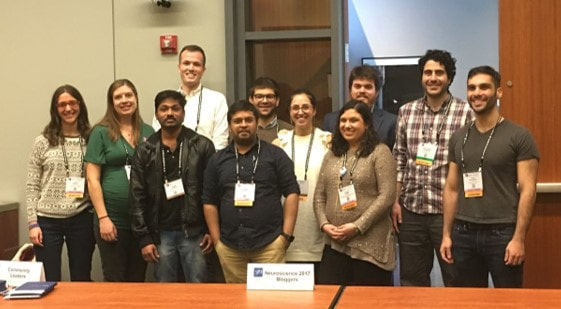Duke University
Features
Duke Scholar Explores A Potent Brew of Religion, Ritual and Psychedelic Drugs | Duke Today | 2024 Apr 03
I was thrilled to learn about the work of religious studies instructor Larissa Carneiro, Ph.D. while researching another story on psychedelics for the School of Medicine. Dr. Carneiro's life and work - from Brazil to Durham and back - stood out as worthy of its own feature, and details her transition from a journalism career to academic research studying the syncretic Church of Santo Daime (Portuguese for “Saint Give Me”), whose congregants regularly consume the indigenous South American psychedelic brew ayahuasca as part of their ritual/service.
Duke Researchers Probe the Magic of Psychedelics as Medicine | Duke University School of Medicine | 2023 Oct 25
A survey of the diverse research and teaching on the potential promise of neuroscience and psychedelics at Duke, including work on zebrafish, how stripping out hallucinations from classic psychedelics might help treat opiod addiction and OCD, and why it's important to teach current findings to undergrads and med students.
Unraveling the Mystery of Migraines (+ video 📺) | Duke University School of Medicine | 2023 May 25
Feature-length profile on the remarkable life and work of Duke neurology professor Carlene Moore, Ph.D., a scientist who studies what she suffers from: migraines.
Campus Stories
Z. Josh Huang | Trailblazers profile for Duke's Centennial | 2024 May
Duke Climate Solutions Panel Offers Cautious Hope for a Warming Planet | Duke Today | 2024 Jan 09
Coverage of a “Climate Solutions” panel as part of Duke's Centennial Research and Innovation Week, including faculty and work spanning the Nicholas Institute for Energy, Environment & Sustainability, the Nicholas School of the Environment, Pratt School of Engineering, and the Sanford School of Public Policy.
Stroke Survivors’ Resilience Captured by Duke Clinician’s Documentary | Duke Today | 2023 June 28
Speech-language pathologist and researcher Jamila Minga, Ph.D, CCC-SLP studies an underdiagnosed communication disorder brought on by strokes, and premiered her first foray into filmmaking as part of Stroke Awareness Month.
A ‘Literally So Perfect’ Neuroscience Internship | Duke Today | 2023 May 09
Summary coming soon!
Young Minds Study the Brain at Duke | Duke Today | 2022 Aug 08
Summary coming soon!
Press Releases
Black Adults at Risk for Alzheimer’s Disease Live in More Polluted Areas, U.S. Study Finds | Duke School of Medicine | 2024 May 14
A study by Duke and Columbia Universities finds older, non-white adults are more likely to live in areas with higher air pollution and near toxic disposal sites, among or environmental injustices, potentially underlying their cognitive health.
Poor Neighborhoods Linked to Elevated Dementia Risk and Faster Brain Aging | Duke Today | 2024 Mar 14
Living in a poorer neighborhood is linked to accelerated brain aging and increased dementia risk early in life, regardless of income level or education, a Duke University-led study finds.
Traumatic Stress Associated With Smaller Brain Region | Duke Today | 2024 Jan 09
Duke researchers led the largest brain imaging study to-date along with a team of global researchers, and found that people with PTSD have a cerebellum about 2% smaller than unaffected adults, especially in areas that influence emotion and memory
Your Eyes Talk to Your Ears. Scientists Know What They’re Saying (+ video, sound on! 📺) | Duke Today | 2023 Nov 20
Scientists can now pinpoint where someone’s eyes are looking just by listening to their ears. Following a 2018 discovery that the ears make a subtle, imperceptible noise when the eyes move, a new report from Duke finds that these ear sounds can reveal where your eyes are looking.
Duke Scientists Create Brain Implant That May Enable Communication From Thoughts Alone | Duke Today | 2023 Nov 06
A speech prosthetic developed by a collaborative team of Duke neuroscientists, neurosurgeons, and engineers can translate a person’s brain signals into what they’re trying to say.
How People Perceive Multiracial Faces Isn’t Always So Black and White | Duke Today | 2023 July 25
Summary coming soon!
This One Simple Brain Hack Might Boost Learning and Improve Mental Health | Duke Today | 2023 July 25
Summary coming soon!
Brain Images Just Got 64 Million Times Sharper | Duke Today | 2023 Apr 17 (+ video 📺)
A decades-long technical tour de force led by Duke researchers improved the resolution of MRI leading to the sharpest images ever captured of a mouse brain.
Kids Judge Alexa Smarter than Roomba, But Say Both Deserve Kindness | Duke Today | 2023 Apr 10
Most kids know it’s wrong to yell or hit someone. But what if that someone’s name is Alexa? A new Duke study asked kids just that, as well as how smart and sensitive they thought the virtual assistant Alexa was compared to a Roomba.
Managers Exploit Loyal Workers Over Less Committed Colleagues | Duke Today | 2023 Mar 20
Company loyalty is a double-edged sword, according to a new study from Duke. Managers target loyal workers over less committed colleagues when doling out unpaid work and additional job tasks.
Race Influences Question Asking as Much as Stroke History | Duke Today | 2023 Jan 11
Strokes that occur on the right side of the brain may subtly impair social communication, which can be difficult for clinicians to assess. But these impairments are a lot less subtle for the patients and their families, who often have their lives and livelihood upended, leading to significant life changes such as job loss and divorce. A new study finds that some right brain stroke survivors ask fewer questions, and that a person’s race – independent of brain injury – affects their inclination to ask questions.
Parents Talk More To Toddlers Who Talk Back | Duke Today | 2022 Dec 1
Hummus. Chewbacca. Tofu. Belly button. These are just a few of the thousands of words scientists at Duke painstakingly decoded from over 2,000 hours of infants’ daily lives. They recently used these data to determine if the amount of language kids hear might explain why girls have bigger vocabularies early in life than boys. It doesn’t. Instead, the researchers found that caregivers just talk more to young children who themselves are already talking, regardless of their gender.
Brain Cells Use A Telephone Trick To Report What They See | Duke Today | 2022 Nov 29
“How many fingers am I holding up?” For vision-sensing brain cells in a monkey’s visual cortex, that answer depends on whether the digits are next to each other or partially overlapping. A new study from Duke University finds that single neurons conveying visual information about two separate objects in sight do so by alternating signals about one or the other. When two objects overlap, however, the brain cells sense them as a single entity.
Mom’s Dietary Fat Rewires Male And Female Brains Differently | Duke Today | 2022 Nov 28
Neuroscientists at Duke found that a high-fat diet during pregnancy triggers immune cells in the developing brains of male but not female mouse pups to overconsume the mood-influencing brain chemical serotonin, leading to depressed-like behavior. A similar thing may be happening in humans, too.
New RNA-Based Tool Can Illuminate Brain Circuits, Edit Specific Cells | Duke Today | 2022 Oct 5
Duke University researchers have developed an RNA-based editing tool that targets individual cells, rather than genes. It is capable of precisely targeting any type of cell and selectively adding any protein of interest. Researchers said the tool could enable modifying very specific cells and cell functions to manage disease.
First-Grade Girls Stick With Science After Pretending to be Marie Curie | Duke Today | 2022 Sept 29
Fake it ‘til you make it is true for children too, it turns out: Young girls embracing the role of a successful female scientist, like Marie Curie, persist longer at a challenging science game. A new study, appearing Sept. 28 in the journal Psychological Science, suggests that science role-playing may help tighten the gender gap in science, technology, engineering, and math (STEM) education and careers for women simply by improving their identity as scientists.
Air Pollution and Stress Alter Brains and Social Behavior of Male Mice | Duke Today | 2022 Aug 3
Naval oceanographer Carina Block had a hunch that the jet exhaust fumes she and her fellow female sailors were regularly exposed to, combined with unavoidable job stress, was leading to adverse health outcomes for their children. A new study in mice backs up Block’s suspicion, finding that air pollution along with housing insecurity while pregnant leads to autism-like social behavior and differently wired brains in male, but not female, pups. The immune system seems to be at fault.
Duke Scientists Find Brain Network That Makes Mice Mingle | Duke Today | 2022 Mar 15
The difference between a social butterfly and a lone wolf is actually at least eight differences, according to new findings by a team of Duke brain researchers. By simultaneously spying on the electrical activity of several brain regions, the researchers found they could identify how social or solitary an individual mouse is. Then, by tweaking nodes within this social brain network, they showed they could prompt mice to be even more gregarious.
Lead exposure in last century shrunk IQ scores of half of Americans | Duke Today | 2022 Mar 07
In 1923, lead was first added to gasoline to help keep car engines healthy. However, automotive health came at the great expense of our own well-being. A new study calculates that exposure to car exhaust from leaded gas during childhood stole a collective 824 million IQ points from more than 170 million Americans alive today, about half the population of the United States.
Birds shuffle and repeat their tunes to keep the audience listening | Duke Today | 2022 Jan 26
The tweets of a little song sparrow and its "bird brain" are a lot more complex and akin to human language than anyone realized. A new study finds that male sparrows deliberately shuffle and mix their song repertoire possibly as a way to keep it interesting for their female audience.
Duke Scholar Explores A Potent Brew of Religion, Ritual and Psychedelic Drugs | Duke Today | 2024 Apr 03
I was thrilled to learn about the work of religious studies instructor Larissa Carneiro, Ph.D. while researching another story on psychedelics for the School of Medicine. Dr. Carneiro's life and work - from Brazil to Durham and back - stood out as worthy of its own feature, and details her transition from a journalism career to academic research studying the syncretic Church of Santo Daime (Portuguese for “Saint Give Me”), whose congregants regularly consume the indigenous South American psychedelic brew ayahuasca as part of their ritual/service.
- Picked up by the Daily Mail.
Duke Researchers Probe the Magic of Psychedelics as Medicine | Duke University School of Medicine | 2023 Oct 25
A survey of the diverse research and teaching on the potential promise of neuroscience and psychedelics at Duke, including work on zebrafish, how stripping out hallucinations from classic psychedelics might help treat opiod addiction and OCD, and why it's important to teach current findings to undergrads and med students.
- Picked up by the Duke student paper The Chronicle, Duke's Communications & Marketing video series, "Check This Out", and Charlotte NC's NPR-affiliate station 90.5 WFAE.
Unraveling the Mystery of Migraines (+ video 📺) | Duke University School of Medicine | 2023 May 25
Feature-length profile on the remarkable life and work of Duke neurology professor Carlene Moore, Ph.D., a scientist who studies what she suffers from: migraines.
Campus Stories
Z. Josh Huang | Trailblazers profile for Duke's Centennial | 2024 May
Duke Climate Solutions Panel Offers Cautious Hope for a Warming Planet | Duke Today | 2024 Jan 09
Coverage of a “Climate Solutions” panel as part of Duke's Centennial Research and Innovation Week, including faculty and work spanning the Nicholas Institute for Energy, Environment & Sustainability, the Nicholas School of the Environment, Pratt School of Engineering, and the Sanford School of Public Policy.
Stroke Survivors’ Resilience Captured by Duke Clinician’s Documentary | Duke Today | 2023 June 28
Speech-language pathologist and researcher Jamila Minga, Ph.D, CCC-SLP studies an underdiagnosed communication disorder brought on by strokes, and premiered her first foray into filmmaking as part of Stroke Awareness Month.
A ‘Literally So Perfect’ Neuroscience Internship | Duke Today | 2023 May 09
Summary coming soon!
Young Minds Study the Brain at Duke | Duke Today | 2022 Aug 08
Summary coming soon!
- Picked up by WUNC (NPR affiliate)
Press Releases
Black Adults at Risk for Alzheimer’s Disease Live in More Polluted Areas, U.S. Study Finds | Duke School of Medicine | 2024 May 14
A study by Duke and Columbia Universities finds older, non-white adults are more likely to live in areas with higher air pollution and near toxic disposal sites, among or environmental injustices, potentially underlying their cognitive health.
- Picked up by Futurity.
Poor Neighborhoods Linked to Elevated Dementia Risk and Faster Brain Aging | Duke Today | 2024 Mar 14
Living in a poorer neighborhood is linked to accelerated brain aging and increased dementia risk early in life, regardless of income level or education, a Duke University-led study finds.
- Picked up by Newsweek, The Telegraph, U.S. News, MedScape, and Futurity.
Traumatic Stress Associated With Smaller Brain Region | Duke Today | 2024 Jan 09
Duke researchers led the largest brain imaging study to-date along with a team of global researchers, and found that people with PTSD have a cerebellum about 2% smaller than unaffected adults, especially in areas that influence emotion and memory
- Picked up by Futurity, Medscape, Aunt Minnie, and Genetic Engineering & Biotechnology News.
Your Eyes Talk to Your Ears. Scientists Know What They’re Saying (+ video, sound on! 📺) | Duke Today | 2023 Nov 20
Scientists can now pinpoint where someone’s eyes are looking just by listening to their ears. Following a 2018 discovery that the ears make a subtle, imperceptible noise when the eyes move, a new report from Duke finds that these ear sounds can reveal where your eyes are looking.
- Picked up by The Transmitter (Dana Foundation), Futurity, New Atlas, and Optometry Today.
Duke Scientists Create Brain Implant That May Enable Communication From Thoughts Alone | Duke Today | 2023 Nov 06
A speech prosthetic developed by a collaborative team of Duke neuroscientists, neurosurgeons, and engineers can translate a person’s brain signals into what they’re trying to say.
- Picked up by BBC [full clip], Newsweek, The Sun, The Independent, Interesting Engineering, Study Finds, Earth.com, and Genetic Engineering & Biotechnology News.
How People Perceive Multiracial Faces Isn’t Always So Black and White | Duke Today | 2023 July 25
Summary coming soon!
This One Simple Brain Hack Might Boost Learning and Improve Mental Health | Duke Today | 2023 July 25
Summary coming soon!
Brain Images Just Got 64 Million Times Sharper | Duke Today | 2023 Apr 17 (+ video 📺)
A decades-long technical tour de force led by Duke researchers improved the resolution of MRI leading to the sharpest images ever captured of a mouse brain.
- Picked up by IFL Science, Interesting Engineering, New Atlas, Tech Times, Daily Mail, Live Science, Physics World, Hack A Day, DotMed, and Spektrum.
Kids Judge Alexa Smarter than Roomba, But Say Both Deserve Kindness | Duke Today | 2023 Apr 10
Most kids know it’s wrong to yell or hit someone. But what if that someone’s name is Alexa? A new Duke study asked kids just that, as well as how smart and sensitive they thought the virtual assistant Alexa was compared to a Roomba.
- Picked up by Wall Street Journal, WUNC (NPR affiliate), Cosmos, New Atlas, Earth.com, Indian Express, and Study Finds.
Managers Exploit Loyal Workers Over Less Committed Colleagues | Duke Today | 2023 Mar 20
Company loyalty is a double-edged sword, according to a new study from Duke. Managers target loyal workers over less committed colleagues when doling out unpaid work and additional job tasks.
- Picked up by VICE, Daily Mail, MarketWatch, LA Weekly, Futurity, and r/science.
Race Influences Question Asking as Much as Stroke History | Duke Today | 2023 Jan 11
Strokes that occur on the right side of the brain may subtly impair social communication, which can be difficult for clinicians to assess. But these impairments are a lot less subtle for the patients and their families, who often have their lives and livelihood upended, leading to significant life changes such as job loss and divorce. A new study finds that some right brain stroke survivors ask fewer questions, and that a person’s race – independent of brain injury – affects their inclination to ask questions.
Parents Talk More To Toddlers Who Talk Back | Duke Today | 2022 Dec 1
Hummus. Chewbacca. Tofu. Belly button. These are just a few of the thousands of words scientists at Duke painstakingly decoded from over 2,000 hours of infants’ daily lives. They recently used these data to determine if the amount of language kids hear might explain why girls have bigger vocabularies early in life than boys. It doesn’t. Instead, the researchers found that caregivers just talk more to young children who themselves are already talking, regardless of their gender.
- Picked up by US News.
Brain Cells Use A Telephone Trick To Report What They See | Duke Today | 2022 Nov 29
“How many fingers am I holding up?” For vision-sensing brain cells in a monkey’s visual cortex, that answer depends on whether the digits are next to each other or partially overlapping. A new study from Duke University finds that single neurons conveying visual information about two separate objects in sight do so by alternating signals about one or the other. When two objects overlap, however, the brain cells sense them as a single entity.
- Picked up by WYPL FM's "Eye on Vision".
Mom’s Dietary Fat Rewires Male And Female Brains Differently | Duke Today | 2022 Nov 28
Neuroscientists at Duke found that a high-fat diet during pregnancy triggers immune cells in the developing brains of male but not female mouse pups to overconsume the mood-influencing brain chemical serotonin, leading to depressed-like behavior. A similar thing may be happening in humans, too.
- Picked up by The Independent, and Nature.
New RNA-Based Tool Can Illuminate Brain Circuits, Edit Specific Cells | Duke Today | 2022 Oct 5
Duke University researchers have developed an RNA-based editing tool that targets individual cells, rather than genes. It is capable of precisely targeting any type of cell and selectively adding any protein of interest. Researchers said the tool could enable modifying very specific cells and cell functions to manage disease.
- Picked up by The Boston Globe, STAT, Spectrum, Nature, Genetic Engineering & Biotechnology News, and The Science Advisory Board.
First-Grade Girls Stick With Science After Pretending to be Marie Curie | Duke Today | 2022 Sept 29
Fake it ‘til you make it is true for children too, it turns out: Young girls embracing the role of a successful female scientist, like Marie Curie, persist longer at a challenging science game. A new study, appearing Sept. 28 in the journal Psychological Science, suggests that science role-playing may help tighten the gender gap in science, technology, engineering, and math (STEM) education and careers for women simply by improving their identity as scientists.
- Picked up by Futurity, science writer Melinda Wenner Moyer, and PS News.
Air Pollution and Stress Alter Brains and Social Behavior of Male Mice | Duke Today | 2022 Aug 3
Naval oceanographer Carina Block had a hunch that the jet exhaust fumes she and her fellow female sailors were regularly exposed to, combined with unavoidable job stress, was leading to adverse health outcomes for their children. A new study in mice backs up Block’s suspicion, finding that air pollution along with housing insecurity while pregnant leads to autism-like social behavior and differently wired brains in male, but not female, pups. The immune system seems to be at fault.
- Picked up by STAT, National Institute for Environmental Health Sciences, The Weather Channel, and Earth.com.
- Awarded 2nd place for Institutional Writing by the Science Communicators of North Carolina.
Duke Scientists Find Brain Network That Makes Mice Mingle | Duke Today | 2022 Mar 15
The difference between a social butterfly and a lone wolf is actually at least eight differences, according to new findings by a team of Duke brain researchers. By simultaneously spying on the electrical activity of several brain regions, the researchers found they could identify how social or solitary an individual mouse is. Then, by tweaking nodes within this social brain network, they showed they could prompt mice to be even more gregarious.
Lead exposure in last century shrunk IQ scores of half of Americans | Duke Today | 2022 Mar 07
In 1923, lead was first added to gasoline to help keep car engines healthy. However, automotive health came at the great expense of our own well-being. A new study calculates that exposure to car exhaust from leaded gas during childhood stole a collective 824 million IQ points from more than 170 million Americans alive today, about half the population of the United States.
- Picked up by the Late Show with Stephen Colbert, Associated Press, NBC, ABC, USA Today, The Hill, Gizmodo, New Scientist, IFL Science, People, Popular Science, Wait Wait Don't Tell Me, CBS17, News & Observer, Health Day, Psychology Today, Insider, Daily Mail, 93.1 KFBK, and Interesting Engineering.
Birds shuffle and repeat their tunes to keep the audience listening | Duke Today | 2022 Jan 26
The tweets of a little song sparrow and its "bird brain" are a lot more complex and akin to human language than anyone realized. A new study finds that male sparrows deliberately shuffle and mix their song repertoire possibly as a way to keep it interesting for their female audience.
- Picked up by NPR, PBS, CNET, and Daily Mail.
Journal of Experimental Biology
3-year position during grad school as a science writer authoring quarterly stories about recent papers in neuroscience.
- Prolactin makes rodent dads care for their rug rats (November 2020)
- Voles light up when they see their mate (August 2020)
- Mouse neurogenous zone doubles during puberty (February 2020)
- Poison frog moms and dads use similar brain cells for parenting (October 2019)
- Singing mice take turns talking (April 2019)
- Acetylcholine boosts turtles' sense of direction (February 2019)
- Hibernating squirrels tweak sodium channels to rest their brain (November 2018)
- Listening to Bach lights up crocodile brains (July 2018)
- Birds and mammals share smartly designed neurons (May 2018)
- Testosterone rapidly boosts male goldfish's eyesight (February 2018)
- Home invaders provoke neighbouring cichlids (November 2017)
- Oestrogens encode love for female mice (August 2017)
- Doped to the bills – dopamine helps birds sing in-tune (May 2017)
- Listen up – spiders can hear airborne sounds (February 2017)
Society for Neuroscience
Official conference blogger for the annual meeting for the Society for Neuroscience, which brings 30,000+ neuroscientists together for an entire week of exciting and diverse research. My assigned themes to cover included Theme D (sensory systems) and Theme F (integrative behavior & physiology).
A compilation of my blogposts from the conference can be found here [website changes led to the original links becoming defunct].
A compilation of my blogposts from the conference can be found here [website changes led to the original links becoming defunct].
|
Writer and website manager for That's Life [Science], a graduate-student created & operated life science blog at UMass Amherst.
Story: Stop, evaluate, and listen - serotonin surges when a female is present (September 2016) |






